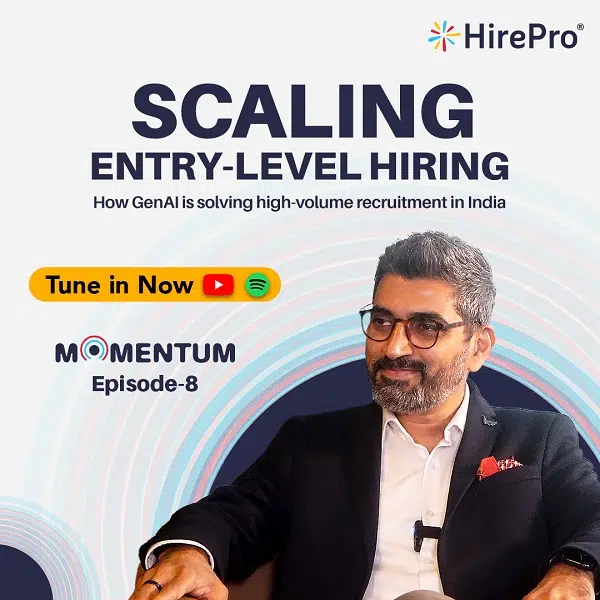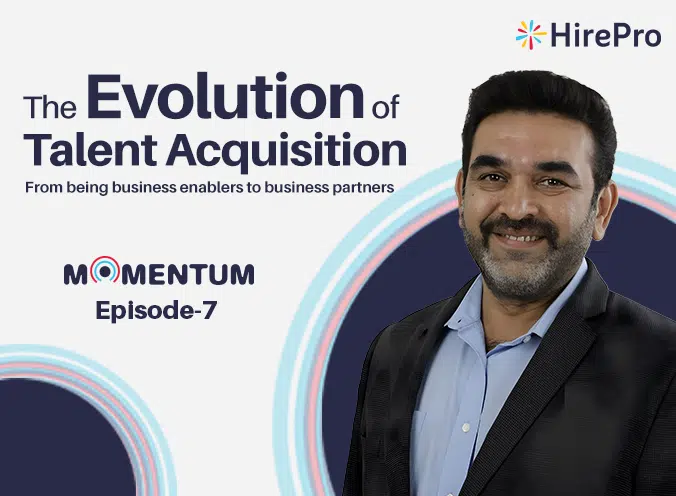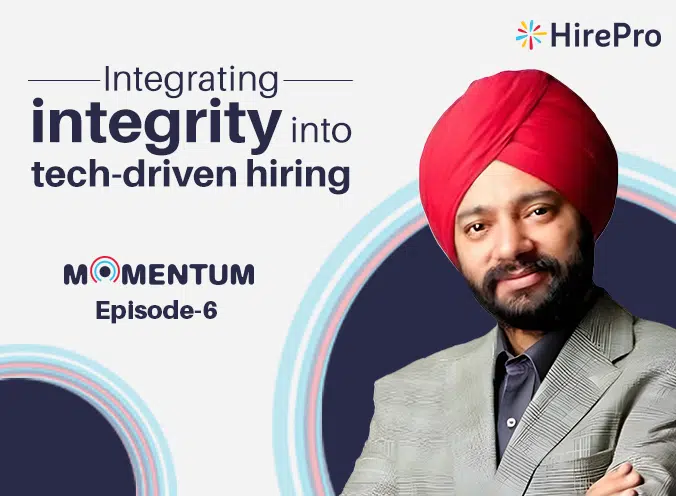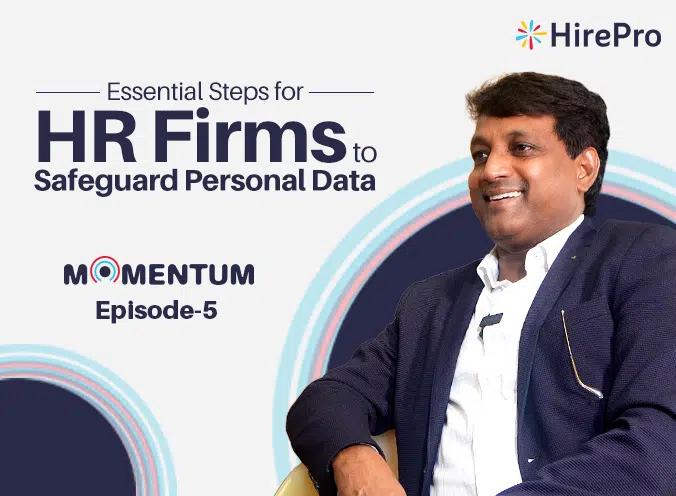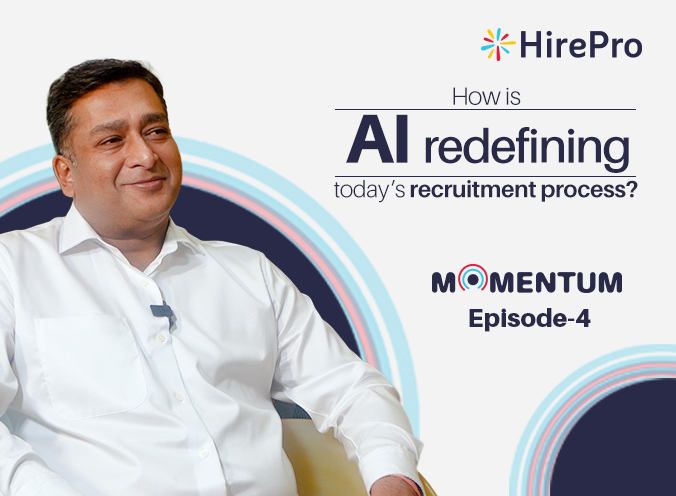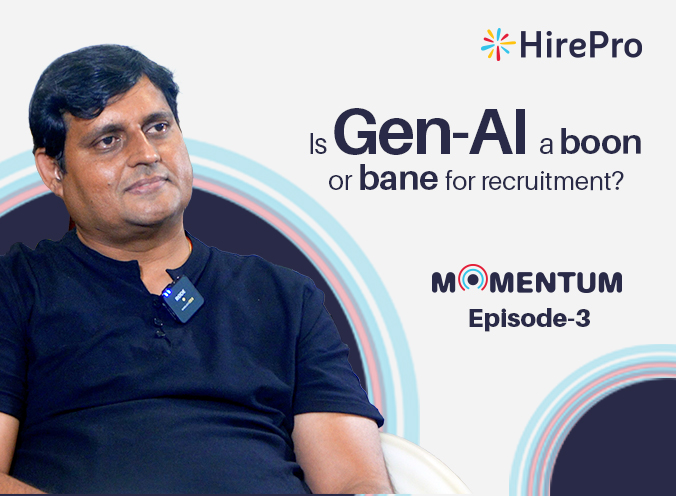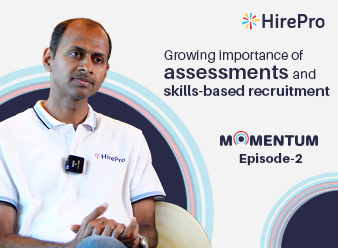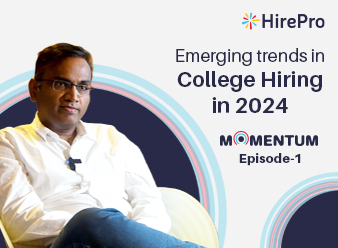In this episode of the Momentum Podcast, we dive into the challenges and opportunities of scaling entry-level hiring in India. Joined by Mr. Mohit Sharma, Head of Talent Acquisition at KPMG India, we delve into how Generative AI (GenAI) is revolutionising talent acquisition, particularly in high-volume and early talent hiring. He shares insights on how Generative AI (GenAI) can transform every touchpoint in the hiring lifecycle. From automating routine tasks to creating personalised candidate experiences, Mohit emphasises the importance of user-centered design principles in building scalable and impactful solutions.
Drawing from his experiences, he highlighted how some organisations are leveraging GenAI to improve interview quality by analysing the nature of questions and offering recommendations to interviewers for enhancement.
Key highlights include:
- Beyond Sourcing & Assessment: Mohit emphasises using GenAI not just for resume screening and assessments but also for enhancing interview quality through AI-driven recommendations and question optimisation.
- Personalised Candidate Engagement: He shares insights from co-creating a chatbot-based candidate relationship platform, highlighting how AI can personalise interactions, reduce offer reneges, and improve onboarding experiences.
- E-Cube Strategy: Mohit introduces his framework—Efficiency, Experience, and Engagement—to align recruitment processes with organisational goals while prioritising candidate satisfaction.
- GenAI in Campus Hiring: Discusses how AI can streamline the entire lifecycle, from engaging with students early to onboarding, making the process seamless for both candidates and employers.
- Designing with Empathy: Advocates for user-centric design principles to build scalable, meaningful solutions and avoid pitfalls in technology implementation.
With practical insights from a seasoned talent acquisition leader, this episode offers a fresh perspective on integrating cutting-edge AI solutions into early talent recruitment while keeping the human touch intact. This discussion is a must-listen for HR professionals, recruiters, and tech enthusiasts seeking to future-proof their hiring strategies.
Subscribe to our YouTube and Spotify channels for more insightful conversations on the future of recruitment, fearless hiring, tech-driven recruitment, college hiring, and innovation in talent acquisition.
You can also tune in to the audio version on Spotify below
Frequently asked questions
Question: How is GenAI revolutionising entry-level hiring?
Answer: GenAI enhances candidate engagement, improves interview quality, streamlines sourcing and assessments, and transforms the entire recruitment lifecycle.
Question: How can generative AI transform high-volume recruitment?
Answer: GenAI automates repetitive tasks like screening, assessments, and engagement, making large-scale hiring faster and more efficient while improving the candidate experience.
Question: What challenges does early talent hiring face, and how can GenAI address them?
Answer: Early talent hiring faces challenges like high volume, intense competition, and manual processes. GenAI tackles these by enabling faster sourcing, accurate assessments, and proactive engagement.
Question: How does GenAI enhance the candidate experience?
Answer: By providing personalised interactions, timely updates, and seamless communication, GenAI ensures a smoother recruitment journey for candidates.
Question: What advice would you give to companies adopting GenAI?
Answer: Focus on clear objectives, user-centric design, and aligning AI tools with organisational goals to enhance efficiency and experience.
Question: What are the future trends in entry-level hiring?
Answer: Increased use of AI for predictive hiring, skills-based assessments, and enhancing onboarding with tailored candidate experiences.
Question: How can organisations improve diversity in high-volume recruitment with AI?
Answer: AI tools can be designed to minimise unconscious bias by focusing on skills and qualifications instead of demographic factors. Additionally, diverse candidate sourcing strategies can be enhanced through AI-powered platforms.
Question: What role does GenAI play in candidate assessment during recruitment?
Answer: GenAI enables dynamic, skills-based assessments tailored to the job role. By analysing candidate responses in real-time, it ensures faster, fairer, and more accurate evaluation processes.
Question: How does AI improve the efficiency of the recruitment process?
Answer: AI automates repetitive tasks like resume screening and initial assessments, allowing recruiters to focus on high-priority candidates and reducing time-to-hire.
Question: What are the benefits of using GenAI in candidate engagement?
Answer: GenAI enhances candidate experience by providing personalised interactions, real-time updates, and quick responses, keeping candidates engaged throughout the recruitment process.
Question: Can AI help in improving the onboarding experience for new hires?
Answer: Yes, AI streamlines onboarding by automating document verification, scheduling training, and answering frequently asked questions, ensuring a smoother transition for new employees.
